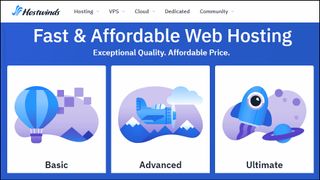Having a reliable and efficient web hosting service is crucial for businesses, bloggers, and other online entities. A robust hosting solution ensures that your website is accessible, secure, and performs optimally for your visitors.
Among the various hosting options available, shared hosting is a popular choice for many, especially those who are just starting their online journey.
This article explains the benefits of choosing shared hosting and provides valuable insights for individuals and businesses considering this option.
Key Takeaways:
- Shared hosting offers a budget-friendly option for those looking to host their websites without breaking the bank.
- With simplified control panels and managed services, shared hosting is an ideal choice for individuals with limited technical knowledge.
- Shared hosting plans are designed to grow with your website, allowing you to upgrade and expand as your needs evolve.
- Shared hosting provides adequate and sufficient storage, bandwidth, and features to support the needs of small to medium-sized websites.
- Shared hosting providers often include pre-installed essential tools such as content management systems, email accounts, and databases, simplifying the setup process for your website.
What is Shared Hosting?
Shared hosting is a type of web hosting service where multiple websites share the resources of a single server. This includes storage space, bandwidth, CPU power, and memory. By allocating these resources among several users, shared hosting allows for a more cost-effective and efficient use of server resources. This makes it an attractive option for individuals and small businesses that are starting their online journey or have limited requirements in terms of resources.
In a shared hosting environment, the hosting provider is responsible for maintaining the server, ensuring its smooth operation, and providing necessary support. Each user is allotted a specific portion of the server’s resources, and all websites hosted on the server draw from this common pool. The hosting provider is also responsible for managing server security, updates, and backups, making it a hassle-free solution for website owners.
While shared hosting users share the server’s resources, their websites and files remain separate and secure from each other. The hosting provider ensures that each account is isolated, preventing unauthorized access or resource overuse by other users on the same server. However, it is essential to note that resource-intensive websites or those with high traffic may experience performance issues in a shared hosting environment, as resources are limited and shared among multiple users.
| Hosting Type | Shared Hosting | VPS Hosting | Dedicated Hosting | Cloud Hosting |
|---|---|---|---|---|
| Cost | Lowest cost | Moderate cost | Highest cost | Flexible cost (pay-as-you-go) |
| Resources | Shared resources | Dedicated resources with some sharing | Fully dedicated resources | Scalable resources on-demand |
| Control and Customization | Limited | High | Full control | Flexible, depends on provider |
| Performance | Sufficient for small to medium websites | Improved performance compared to shared hosting | Optimal performance | Scalable performance based on demand |
| Security | Basic security measures | Enhanced security | Highest level of security | Depends on provider, often strong security |
| Scalability | Limited | Moderate | Low (requires upgrading to a new server) | Highly scalable |
| Best For | Individuals, small businesses, and beginners | Medium-sized businesses and websites with higher resource requirements | Large businesses with high traffic and resource-intensive websites | Businesses with fluctuating resource demands and rapid growth |
Advantages of Shared Hosting
| Advantage | Description | Importance |
|---|---|---|
| Cost-Effectiveness | Affordable pricing and shared resources result in lower expenses for each user. | Allows individuals and small businesses to establish an online presence without breaking the bank. |
| User-Friendliness | Intuitive control panels and managed services simplify website management. | Enables users with limited technical knowledge to manage their websites effectively. |
| Scalability | Upgrade options and flexibility accommodate growing websites. | Ensures that users can expand their hosting resources as their website and traffic grow. |
| Sufficient Resources | Storage, bandwidth, and support for multiple domains and subdomains cater to the needs of most small to medium-sized websites. | Provides the necessary resources for users to build and manage their websites efficiently. |
| Pre-installed Software and Features | One-click installations, email accounts, and databases simplify the setup process. | Reduces the time and effort required to get a website up and running, allowing users to focus on content and business development. |
| Technical Support and Customer Service | Responsive customer support, knowledge bases, and tutorials assist users in managing their websites. | Provides users with expert assistance and resources to navigate and resolve hosting-related issues. |
| Security Features | Basic security measures, SSL certificates, and server updates protect websites from threats. | Enhances the safety and integrity of websites, instilling trust and confidence in visitors. |
| Performance Optimization | Server-side caching and CDN integration improve website loading speed and performance. | Offers a better user experience, which can lead to higher engagement and conversion rates. |
| Backup Solutions | Regular backups and additional backup solutions safeguard website data. | Ensures that users can quickly recover their websites in case of data loss or other issues. |
| Eco-Friendliness | Reduced carbon footprint and energy-efficient data centers minimize environmental impact. | Contributes to a more sustainable hosting solution and demonstrates environmental responsibility. |
| Community and Networking Opportunities | Shared hosting user communities, forums, and social media groups connect users and facilitate information sharing. | Provides valuable insights, advice, and networking opportunities for website owners. |
| Trial Periods and Money-Back Guarantees | Risk-free trials allow users to test hosting services before committing to a long-term plan. | Enables users to make informed decisions by evaluating the performance, features, and support offered by the provider. |
| Customization and Control | Configuration options, access to server logs, and statistics allow users to tailor their hosting environment and monitor website performance. | Empowers users to optimize their websites and make data-driven decisions to improve user experience and overall site performance. |
1. Cost-Effectiveness
Shared hosting plans typically come with affordable pricing, making them an attractive option for budget-conscious individuals and small businesses. Since server resources are shared among multiple users, the cost of maintaining the server is divided, resulting in lower expenses for each user.
2. User-Friendliness
Shared hosting providers offer intuitive control panels that allow users to manage their websites without the need for advanced technical knowledge. Most shared hosting plans include managed services, meaning the hosting provider handles server maintenance, updates, and security, allowing website owners to focus on their content and business.
3. Scalability
As your website grows, shared hosting providers often offer seamless upgrade options to higher-tier plans or even other hosting types, such as VPS or dedicated hosting. Shared hosting plans come with various resource allocations, allowing you to choose a plan that meets your current needs and easily scale up as your website expands.
4. Sufficient Resources
Shared hosting plans provide adequate storage and bandwidth for small to medium-sized websites, catering to the needs of most users in this category. Many shared hosting providers allow users to host multiple domains and subdomains under a single account, offering flexibility in managing multiple websites.
5. Pre-installed Software and Features
Shared hosting providers often include one-click installation tools for popular content management systems (CMS) like WordPress, Joomla, and Drupal, as well as other essential features such as email accounts, databases, and SSL certificates. This simplifies the setup process and makes it easier for users to get their websites up and running quickly.
6. Email Accounts
One of the advantages of shared hosting is the inclusion of email accounts linked to your domain. These personalized email addresses enhance your professional image and make communication with customers and clients more efficient. Shared hosting providers often offer webmail access, email forwarding, and autoresponders, allowing you to manage your email accounts effortlessly.
7. Databases
Databases are essential for managing the data of your website, such as user information, content, and other critical elements. Shared hosting plans typically include support for multiple databases, such as MySQL or PostgreSQL, depending on the provider. This enables you to run various applications and content management systems that rely on databases to store and retrieve data. Hosting providers often offer user-friendly tools to manage databases, making it easier for users to create, modify, and backup their databases as needed.
8. Technical Support and Customer Service
Shared hosting providers generally offer dedicated customer support through various channels, such as live chat, phone, and email. This ensures that you have access to expert assistance whenever you face any issues or have questions about your hosting account. Most shared hosting providers offer comprehensive knowledge bases, tutorials, and other resources to help users navigate their hosting plans and manage their websites effectively. This support material can be invaluable for beginners who are new to web hosting.
9. Security Features
Shared hosting providers implement basic security measures to protect your website from threats. This includes firewalls, malware scanning, and regular server updates to patch vulnerabilities. Many shared hosting providers offer free SSL certificates to encrypt the data transmitted between your website and its visitors. This enhances the security of your site and helps build trust with your users.
10. Performance Optimization
Some shared hosting providers offer server-side caching features to enhance the performance of your website. Caching stores a version of your web pages on the server, reducing the time it takes to load your site for visitors. Shared hosting providers may offer integration with content delivery networks to improve your website’s loading speed and performance. CDNs store copies of your site’s static files on servers located around the world, ensuring faster delivery to users regardless of their location.
11. Backup Solutions
Many shared hosting providers offer regular backups of your website data, ensuring that you can quickly recover your site in case of data loss or other issues. Some providers offer daily, weekly, or monthly backups, along with easy restoration options. Some shared hosting providers offer additional backup solutions, such as paid add-ons or third-party integrations, giving you more control and flexibility in managing your website’s backups.
12. Eco-Friendliness
By sharing server resources among multiple users, shared hosting contributes to a reduced carbon footprint compared to dedicated hosting solutions. Some shared hosting providers also use energy-efficient data centers or renewable energy sources to further minimize their environmental impact.
13. Community and Networking Opportunities
Many shared hosting providers have active user communities, forums, or social media groups where users can share their experiences, seek advice, and connect with others. These communities can be an invaluable source of information and networking opportunities for website owners.
14. Trial Periods and Money-Back Guarantees
Some shared hosting providers offer trial periods or money-back guarantees, allowing you to test their services before committing to a long-term plan. This gives you the opportunity to evaluate the performance, features, and support offered by the provider, ensuring you make an informed decision.
15. Customization and Control
While shared hosting may not offer the same level of customization as VPS or dedicated hosting, many providers still provide a range of configuration options. This includes the ability to select PHP versions, enable or disable certain extensions, and modify server settings to suit your website’s needs.
Shared hosting providers often grant users access to server logs and statistics, allowing you to monitor your website’s performance, traffic patterns, and potential issues. This data can be helpful for optimizing your website and making data-driven decisions.
How to Choose a Shared Hosting Provider
When selecting a shared hosting provider, it’s essential to consider various factors to ensure that you choose the right one for your needs.
Here are some key aspects to consider when evaluating shared hosting providers:
- Uptime and Reliability: Uptime refers to the percentage of time that a hosting provider’s servers are operational and accessible. A higher uptime means that your website will be available to visitors more consistently. Look for a provider that offers a service level agreement (SLA) with an uptime guarantee of at least 99.9%.
- Performance: The loading speed and responsiveness of your website are crucial for providing a good user experience and maintaining visitor engagement. Research and compare the performance of different shared hosting providers to find one that meets your performance requirements.
- Features and Resources: Assess your website’s needs in terms of storage, bandwidth, email accounts, databases, and other features. Choose a shared hosting provider that offers the resources and features you require, along with the flexibility to upgrade as your website grows.
- Security: Opt for a provider that offers robust security measures, such as firewalls, malware scanning, SSL certificates, and regular server updates. This will help protect your website from potential threats and vulnerabilities.
- Technical Support: Responsive and knowledgeable client support is crucial when you encounter issues or have questions about your hosting account. Look for a shared hosting provider that offers support through multiple channels, such as live chat, phone, and email, along with a comprehensive knowledge base and tutorials.
- Pricing: Compare the pricing plans of different shared hosting providers, keeping in mind any additional costs, such as domain registration, SSL certificates, or backups. Ensure that you choose a provider that fits within your budget and offers good value for money.
- User Reviews: Conduct research on user reviews, testimonials, and ratings to gain insight into the experiences of other customers with the shared hosting provider. This will help you better understand the quality of their services and support.
- Money-Back Guarantee: A money-back guarantee or trial period allows you to test the services of a shared hosting provider before committing to a long-term plan. Choose a provider that offers a risk-free trial so you can evaluate their performance, features, and support to ensure they meet your needs.
By carefully considering these factors and conducting thorough research, you can find the ideal shared hosting provider for your website and ensure a reliable and satisfying online presence.
Conclusion
In conclusion, shared hosting offers numerous benefits for individuals, small businesses, and beginners looking to establish an online presence. With its cost-effectiveness, user-friendly interfaces, and a plethora of features, shared hosting can be an ideal solution for those who want to host their websites without breaking the bank or needing advanced technical knowledge.
When choosing a shared hosting provider, it’s essential to consider factors such as uptime, performance, features, security, customer support, and pricing. Conduct thorough research and comparisons to find the provider that best meets your needs and offers the resources necessary for your website to grow and thrive.
By following the tips and best practices outlined in this article, you can make the most of your shared hosting experience and ensure the smooth operation of your website. Keep your website updated, secure, and optimized for performance to provide an excellent user experience and maintain visitor engagement. With the right shared hosting provider and proper management, you can create a successful and sustainable online presence.
FAQ
-
What is shared hosting?
Shared hosting is a type of web hosting service where multiple websites share the same server and its resources, such as storage, bandwidth, and processing power. This allows for cost-effective hosting solutions for individuals, small businesses, and beginners who are looking to establish an online presence without requiring extensive technical expertise.
-
Is shared hosting suitable for my website?
Shared hosting is generally suitable for small to medium-sized websites with moderate traffic levels. If you’re just starting your website or running a small business, shared hosting is likely a suitable option. However, if your website experiences high traffic levels, requires more resources, or has specific security and performance requirements, you might need to consider other hosting options such as VPS, dedicated, or cloud hosting.
-
How can I migrate my website to a shared hosting provider?
To migrate your website to a shared hosting provider, follow these steps: 1) Purchase a hosting plan from your chosen provider. 2) Backup your existing website files and databases. 3) Upload your website files to the new hosting account using an FTP client. 4) Import your databases to the new hosting account. 5) Update your domain’s DNS settings to point to the new hosting provider. Note that some hosting providers offer free migration services, which can simplify the process and ensure a smooth transition.
-
Can I upgrade from shared hosting to another type of hosting in the future?
Yes, you can upgrade from shared hosting to another type of hosting, such as VPS, dedicated, or cloud hosting, as your website grows and requires more resources. Most hosting providers offer seamless upgrading options, allowing you to scale your hosting plan as needed without significant downtime or disruption to your website’s operation.
-
How do I ensure the security of my website on a shared hosting plan?
To ensure the security of your website on a shared hosting plan, follow these best practices: 1) Choose a reputable hosting provider with robust security measures, such as firewalls, malware scanning, and SSL certificates. 2) Regularly update your website’s content management system, themes, and plugins. 3) Use strong passwords and enable two-factor authentication for your hosting account and website admin panel. 4) Regularly back up your website files and databases. 5) Install security plugins or extensions to add extra protection to your website. 6) Monitor your website for any suspicious activities or unauthorized access attempts. By following these security best practices, you can minimize the risk of security breaches and maintain the safety of your website and user data while using a shared hosting plan.
https://webhostinggeeks.com/blog/shared-hosting-benefits/






